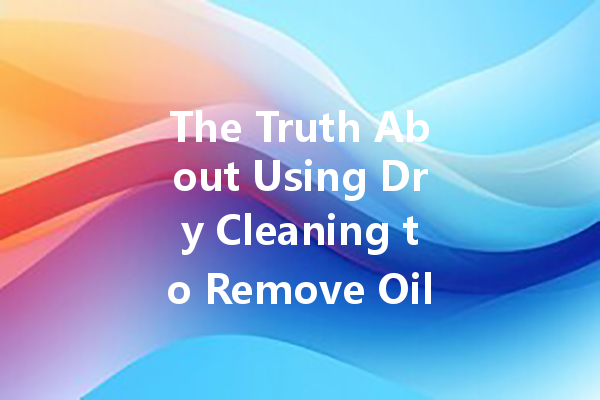Oil stains on fabrics can be a nightmare. Whether it’s from cooking oil, motor oil, or even cosmetics, these stains often seem impossible to remove. While many people reach for home remedies or common laundry detergents, one effective solution is often overlooked: dry cleaning. In this article, we’ll explore the ins and outs of using dry cleaning to remove oil stains from fabrics and what you need to know to protect your favorite garments.
Understanding Dry Cleaning
What is Dry Cleaning?
Dry cleaning is a cleaning process that uses non-water-based solvents to remove dirt and stains from fabrics. Unlike traditional washing methods that rely on water, dry cleaning utilizes a liquid solvent, typically perchloroethylene (also known as perc), which effectively dissolves oils and greases. This method is especially useful for delicate fabrics like silk and wool, which can be damaged by water.
How Does It Work?
The dry cleaning process typically involves several steps:
The Benefits of Dry Cleaning for Oil Stains
Effectiveness
Dry cleaning is known for its superior ability to remove oil stains compared to regular washing. The solvents used in dry cleaning penetrate the fabric fibers effectively, breaking down the oil molecules and lifting them away. This process reduces the risk of setting the stain, which commonly occurs if water-based detergents are used improperly.
Gentle on Fabrics
While home washing can often lead to shrinkage or damage, dry cleaning is much gentler on delicate fabrics. Dry cleaning removes stains without the use of harsh scrubbing or excessive agitation, making it the preferred choice for valuable and delicate items, such as evening gowns and winter coats.
Convenience
For those with busy lifestyles, dry cleaning offers a convenient alternative. Many dry cleaners offer pickup and delivery services, saving you valuable time. Moreover, the expertise provided by professional cleaners ensures that your garments are treated with the utmost care.
Preparing Your Clothes for Dry Cleaning

Check Labels
Before sending any items to the dry cleaner, always check the care labels. Garments labeled “dry clean only” are specifically designed to withstand the dry cleaning process, while those that are machine washable may not need this treatment.
Identify Stains
Make sure to inform your dry cleaner about any specific stains, including oil stains. This will help them to pre-treat the stains effectively and choose the appropriate cleaning method.
Limitations of Dry Cleaning
Cost Implications
One downside to dry cleaning is the cost. While it can save clothes from unsightly stains, regular dry cleaning can become expensive over time, especially for large items like suits or winter coats. However, the investment may be worthwhile when dealing with expensive or cherished clothing.
Not All Stains Are Removable
While dry cleaning is effective on many oil stains, not all stains can be guaranteed to be completely removed. Factors such as the age of the stain, the type of fabric, and how long the oil has been present influence the cleaning outcome. It’s essential to be realistic about the possibilities.
Tips for Preventing Oil Stains
Act Quickly
If you find yourself with an oil stain, acting quickly is crucial. Blot the stain gently with a clean cloth to remove excess oil and prevent it from settling deeper into the fabric. The sooner you address the stain, the better your chances are of complete removal.
Avoid Rubbing
When treating an oil stain, always blot instead of rubbing. Rubbing can push the stain further into the fibers, making it more challenging to remove.
Consider Professional Help
If you’re uncertain about how to treat an oil stain, or if the stain is particularly stubborn, seek professional help. Dry cleaners are trained to handle delicate fabrics and tough stains, ensuring your clothing receives the best treatment possible.
Conclusion
Dry cleaning is a valuable tool in the fight against oil stains, offering a blend of effectiveness, convenience, and garment care that is hard to match with home washing. While it comes with some limitations, understanding how dry cleaning works and what it can do for your clothes can help you make informed choices about fabric care. By acting quickly and taking proper preventive measures, you can keep your favorite garments looking their best.
